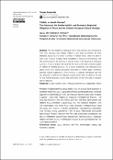Yiddish, or Jewish German? : The Holocaust, the Goethe-Institut, and Germany’s neglected obligation to peace and the common European cultural heritage
Abstract
The vast majority of Holocaust victims and survivors were Ashkenazim. Their main language was Yiddish. Yiddish is very close to German, the main difference being that the former is written in Hebrew letters, while the latter in Latin ones. Postwar Europe’s moral foundation is Holocaust remembrance. But this remembrance to be effective, it must be active in the absence of Holocaust survivors. A way to ensure that could be the novel school and university subject of Yiddish for reading purposes. As a result, researchers and interested Europeans would start reading documents and books in Yiddish again. Germany’s premiere cultural organization, Goethe-Institut, is uniquely well-placed and morally obligated to facilitate the relaunch, popularization and cultivation of the skill to read Yiddish-language sources and publications for both the sake of research and for pleasure.
Citation
Kamusella , T 2021 , ' Yiddish, or Jewish German? The Holocaust, the Goethe-Institut, and Germany’s neglected obligation to peace and the common European cultural heritage ' , Śląskie Studia Polonistyczne , vol. 18 , no. 2 , pp. 1-18 . https://doi.org/10.31261/SSP.2021.18.14
Publication
Śląskie Studia Polonistyczne
Status
Peer reviewed
ISSN
2353-0928Type
Journal article
Collections
Items in the St Andrews Research Repository are protected by copyright, with all rights reserved, unless otherwise indicated.

